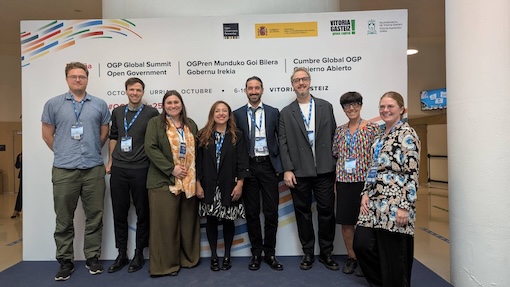OGP Global Summit in the Basque Country – Open Government remains a work in progress

In 2025, the goals of the Open-Government-Partnership-Initiative have lost none of their relevance. On the contrary, transparency, citizen participation, and spaces for civil society are indispensable for democracy to function, yet they can no longer be taken for granted.
These very issues and challenges were at the heart of the OGP Global Summit in Vitoria-Gasteiz, Basque Country, which brought together people from politics, administration and civil society to share ideas and draw inspiration from examples from other countries and administrations. With over 2,000 participants showcasing best practices from 70 countries, inspiration was easy to find. However, it also became clear how open government is currently practised differently internationally.
Between democratic fatigue and well-known transparency issues
The numerous high-level panel discussions mostly revolved around new and old narratives, such as the importance of political transparency, social participation, and open-source technologies for democracies at different stages of development. The current political situation in the respective countries was sometimes implicitly referenced and sometimes explicitly emphasised. For example, when panellists from France — which, at the time, had no functioning government — or the United States — whose administration is actively working against the core values of the OGP — spoke about rapid technological developments that democratic processes are currently unable to keep up with. In contrast, the hosting Basque Country and Spanish government, which were represented in the OGP Action Plans with many local projects, presented themselves differently.
The OGP was also given great symbolic significance at the national level: both the Spanish President and the King gave speeches at the summit. They emphasised the importance of transparency for trust in political institutions and reaffirmed Spain’s commitment to the Open Government Partnership. This year, many Spanish-speaking countries presented their projects. This included, for example, examples of the use of open data in environmental monitoring in Central America or initiatives to publish procurement and budget data, which were also reflected in numerous participations in the Open Government Challenge.
European civil society under pressure
When looking at Europe, similar challenges for civil societies emerged between the lines everywhere. In addition to widespread financial cuts, the delegitimisation of non-governmental organisations’ work is also an issue in Germany’s neighbouring countries. The same applies to the lack of participation in decision-making processes, which contrasts sharply with politicians’ assurances about the importance of civil society work for digital policies that promote the common good.
These trends were also reflected in the Vitoria-Gasteiz-Declaration. In the joint declaration, the signatory governments, city administrations and NGOs expressed their concern about „intensifying restrictions on civic space, media freedom, and access to information, as well as increasing risks, harassment, and shrinking financial support faced by civil society organizations, journalists, human rights defenders, and grassroots actors“.
New ministry – new opportunity for OGP in Germany?
The German federal government was among the signatories of the Vitoria-Gasteiz Declaration. The OGP programme has produced four national action plans in Germany. However, civil society is still not adequately involved in the development and implementation of the action plans, for example within the framework of a multi-stakeholder forum (MSF). The MSF is part of the OGP’s standard toolkit and provides a framework for the collaboration between the government and civil society organisations. Alongside Transparency International Germany and the Open Government Institute, the Open Knowledge Foundation (OKF) is working on a project funded by the Helen Darbishire Fund for Civil Society to revitalise OGP efforts in Germany, placing a stronger focus on civil society.
The numerous international examples of open government, and the political support for it, which became apparent in Vitoria, can serve as a positive model for the German government. Responsibility for this issue has been transferred to the newly established Ministry for Digitalisation and State Modernisation. In the current climate of DOGE, Musk and Milei, the principles and goals of the OGP are particularly important as a counterbalance. The next National Action Plan must build on the newfound momentum and actively involve civil society in government projects. This would also breathe life into point 2 of the Vitoria-Gasteiz-Declaration: „Promote open government principles across all branches and levels of government to embed transparency, accountability, and participation into public institutions“.